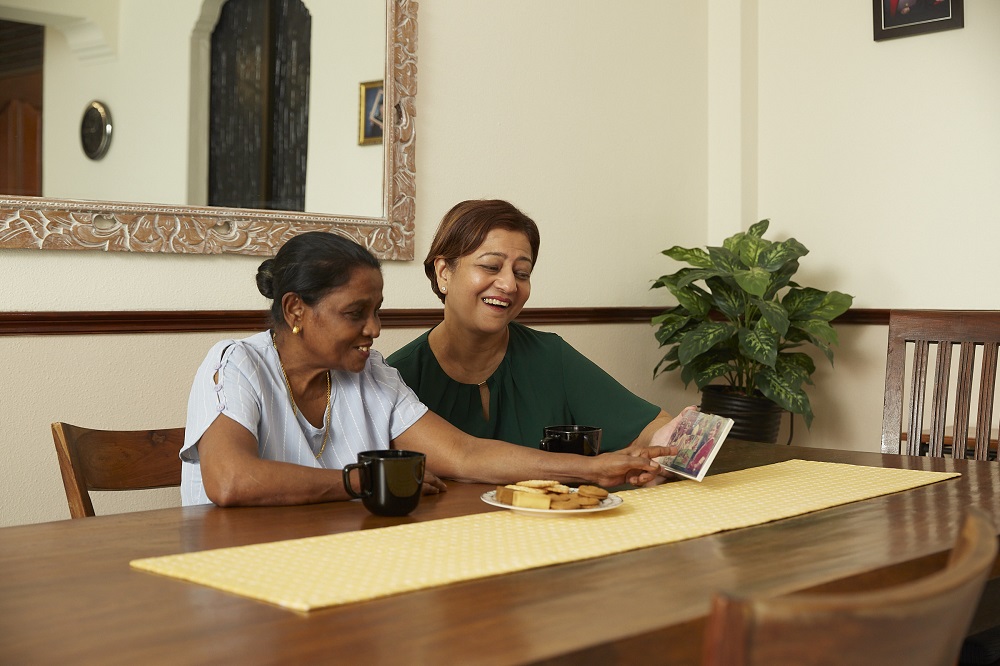Reading time: 5 mins

Kewaljeet (right) and her MDW Kusuma.
A helper can take on household chores, but a helper with whom you have built a good relationship can change your life for the better. We spoke to a long-time employer of a migrant domestic worker (MDW) to learn how she achieved this.
30 years of friendship
Kewaljeet Kaur D/O Harbajan Singh has employed Pothupitiya Gamathige Kusumawathie (Kusuma) for over 30 years. The two have become so close that Kewaljeet had flown her whole family to Sri Lanka to celebrate the wedding of Kusuma’s son. Beloved by Kewaljeet’s extended family, Kusuma is also frequently invited to participate in their family functions as a guest, “Kusuma will get a separate invitation card of her own,“ Kewaljeet described.
Overcoming a challenge
Their relationship was not smooth sailing from the start. When the two met in 1993, Kewaljeet had doubts. “She’s really small in size,” Kewaljeet recounted. “I wondered if she could manage the household.”
The uncertainty was amplified by differences in language, religion, and culture. Not only was Kusuma unfamiliar with English, she was also new to tasks like preparing common Singaporean dishes and using modern appliances.
Kusuma had her reservations too. “What kind of people will I meet? I didn’t know. I was scared. So when I went to sleep I locked the door. Every day.”
Respecting freedoms
“When we found out that she was locking her door, we told her to continue to do so until she had enough reason to trust us. Then, over time, we built that trust,” Kewaljeet said.
This simple act of empathy laid the foundation for a strong relationship to blossom. Over time, open conversations replaced closed doors, and Kusuma proved to be a valuable employee. She completed all her tasks to high standards, put in effort to learn English, prepared nourishing soups for family members who were not feeling well and more. This mutual effort solidified their connection.
Showing greater initiative
Kewaljeet was happy to show how much she appreciated Kusuma’s attitude. Kewaljeet gave her freedom to manage tasks her way, from choosing meal menus to deciding where to clean. The family also entrusted finances for expenses like grocery shopping to her.
In addition, Kewaljeet restricted neither Kusuma’s meal schedules nor movement. “Having too many rules and restrictions brings a lot of unhappiness into the home. Forcing your helper to wait until as late as 10 pm before they can eat is not right,” Kewaljeet said.
Thoughtful tokens
Kewaljeet also mentioned gifts. “We give Kusuma bonuses for work well done, and make sure she has money to spare when she goes home on holiday.” Kewaljeet also bought souvenirs for Kusuma when overseas and ordered meals for her when she’s tired. For Kusuma’s 60th birthday, Kewaljeet threw a surprise party and invited Kusuma’s friends. “I know that they love me very much,” Kusuma added. “Madam (Kewaljeet) even gives me clothes, books, toys and other gifts to send back home every month.”
Kusuma pampered the family in return. For instance, she developed a pastime of viewing cooking tutorials. “We’re her guinea pigs,” Kewaljeet joked. “She ‘tests’ new cuisines on us. Now, she can make Indian, Italian, and Chinese dishes.”

Kewaljeet and Kusuma recounting their many shared experiences.
Growing together
Three decades of care for one another has built a bond that will last a lifetime. “Kusuma has truly become family. She has witnessed marriages, the joy of children being born, and the sorrow of losing loved ones. She's an integral part of us. Like any meaningful relationship, ours needed time to grow and flourish. It's like tending to a plant – providing it with water, sunlight, and nourishment. We've learned to appreciate the goodness she brings into our lives,” said Kewaljeet.
From making the effort to wake up throughout the night to check on Kewaljeet’s children when they fell ill, to offering a patient listening ear to Kewaljeet and her family members, Kusuma has proven time and again that she is a pillar of the family. These were just some of the stories the pair recounted with a smile during the interview as Kewaljeet helped Kusuma wipe off her tears that the latter bashfully tried to hide.
Through the story of Kewaljeet and Kusuma, we can see the secret behind their good relationship is not grand gestures, but a series of everyday choices that employers and MDWs can make. Their story demonstrates that by showing empathy and expressing appreciation to your helper, it is possible to build an enduring and fulfilling partnership that benefits your household in the long run.